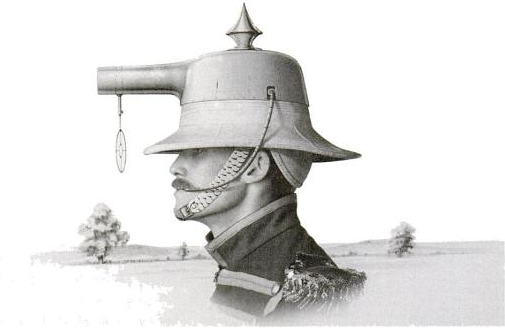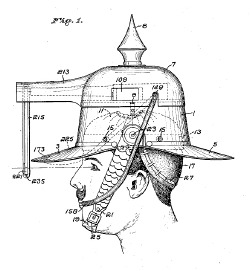Albert Bacon Pratt’s Helmet Gun

In 1916 Albert Bacon Pratt of Lyndon, Vermont was issued patent No. 1183492 for a "gun adapted to be mounted on and fired from the head of the marksman." The wearer fired the gun by blowing into a tube. Most of Pratt's patent application is fairly dry and technical, but here he offers his thoughts on some of the advantages of his invention:
The weapon described has many advantages. The gun is automatically aimed unconsciously and incidentally to the turning of the head of the marksman in the direction of the target. In self-protection, one immediately, instinctively turns the head in the direction of attack to see the enemy, or, in hunting, toward any sound made by nearby game. Thus the gun is automatically directed toward the mark in the course of the first instinctive movement. With the gun thus aimed, the only further operation necessary to fire the same is to blow through the tube and thereby expand the bulb and operate the trigger. This is accomplished entirely from the head of the marksman, leaving his hands and feet free further to defend himself or for other purposes as desired. Under some circumstances the gun can be fired not only without the use of the hands and feet, but also without the use of the eyes of the marksman. For example, in hunting at night if an animal made a sound in underbrush, the head of the marksman would be instinctively turned in the direction of the sound and then the gun would be fired, without the use of the eyes of the marksman.

Pratt then points out that his invention is useful not only in combat, but also in the kitchen:
The crown section of the helmet when detached from the base of the helmet may be inverted and used as a cooking utensil, the elongated hood projecting therefrom for protecting the barrel of the gun serving as the handle therefor.
Pratt claimed he had solved the problem of recoil:
The "blow-back" causes the breech-bolt to retreat and automatically cock the hammer, but the strong spring back of the breech-bolt forces the same so quickly forward again following the recoil, that the two movements naturalize one another so promptly that no discomfort to the wearer results from the recoil.
But I suspect he didn't have all the bugs ironed out, which must be why such a useful invention never caught on.
Comments
It looks as though it does have a sight.
I would still be concerned with recoil. Seems like the helmet would have to be very tight on your head as to not shift from the recoil and screw up the next shot.
I would still be concerned with recoil. Seems like the helmet would have to be very tight on your head as to not shift from the recoil and screw up the next shot.
Posted by Madd Maxx on 02/20/09 at 07:55 AM
It always comes back to bacon, doesn't it 😊
Posted by Jules in Connecticut on 02/20/09 at 08:20 AM
Jules - Yes it does...well that and pancakes!!!
It doesn't say how many shots it holds either. Don't want to have to reload if a bear is charging you.
It doesn't say how many shots it holds either. Don't want to have to reload if a bear is charging you.
Posted by Madd Maxx on 02/20/09 at 08:26 AM
How fast can it really fire if the trigger is blowing in a tube?
Posted by Jules in Connecticut on 02/20/09 at 08:32 AM
Women should be able to fire faster do to experience with blowing things.
Posted by Madd Maxx on 02/20/09 at 08:36 AM
nice try 😉 except that not blowing, its licking & sucking
Would the gun backfire if you sucked in instead?
Would the gun backfire if you sucked in instead?
Posted by Jules in Connecticut on 02/20/09 at 08:48 AM
leaving his hands and feet free further to defend himself or for other purposes as desired
One use, not mentioned, would be when coitus was interrupted by an expectantly returning hubby. One could blow him away and never loose a stroke.
One use, not mentioned, would be when coitus was interrupted by an expectantly returning hubby. One could blow him away and never loose a stroke.
Posted by Expat47 in Athens, Greece on 02/20/09 at 08:57 AM
Serious chance of accidental murder during the Big O though
Posted by Jules in Connecticut on 02/20/09 at 09:02 AM
Gives new meaning to blowing your load though.
Posted by DownCrisis on 02/20/09 at 09:21 AM
Jules, can you say licking and sucking again?
Posted by Madd Maxx on 02/20/09 at 09:35 AM
I finally found a suitable weapon to go with my supervillan costume. Could this be fitted with a net or harpoon instead of firing bullets?
Posted by Matt in Florida on 02/20/09 at 10:13 AM
I don't care what any of you say, I want one.
Posted by mrjazz on 02/20/09 at 11:57 AM
Wow, someone paid 32 bucks for that General picture.
Posted by Viceman48 on 02/20/09 at 01:33 PM
Later that year the personal physician of Albert Bacon Pratt of Lyndon, Vermont made medical history when he published the first medical description of whiplash injuries.
Posted by tadchem on 01/04/13 at 01:08 PM
Commenting is not available in this channel entry.

Category: Inventions | Patents | Weapons